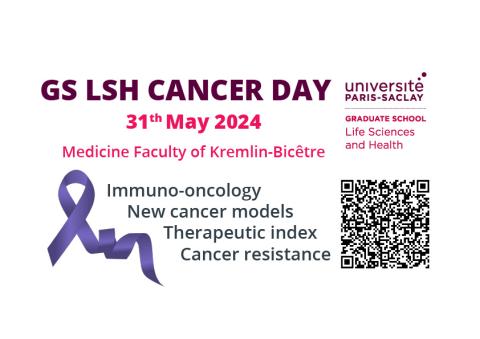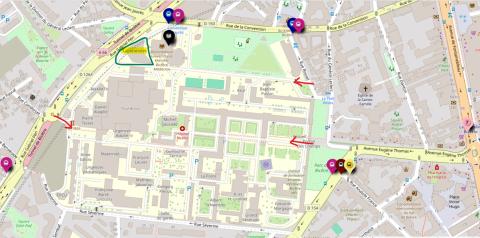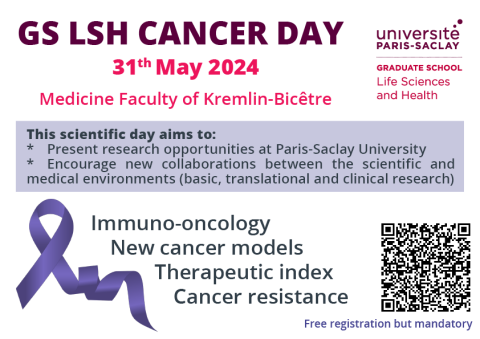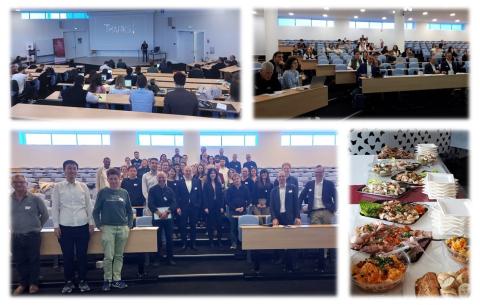
GS LSH Cancer day
La Graduate School Life Sciences and Health (GS LSH) organise une journée scientifique intitulé " GS LSH Cancer Day " le vendredi 31 mai 2024 au nouveau bâtiment de recherche de la Faculté de Médecine, 63 Rue Gabriel Péri, 94270 Kremlin-Bicêtre.
Ce colloque se déroulera en présentiel et distanciel de 9h à 17h30, et débutera avec la présentation des opportunités de recherche à Université Paris-Saclay dans le cadre de l'IHU PRISM, de l'objet interdisciplinaire New Frontiers in Cancer et du Paris Saclay Cancer Cluster. Ensuite les aspects scientifiques seront présentés par des chercheurs et jeunes chercheurs de notre périmètre, sur quatre thématiques principales:
- Immuno-oncologie
- Nouveaux modèles pour étudier le cancer
- Nouveaux traitements du cancer
- Résistance du cancer
Synthèse de cette journée scientifique
La journée scientifique « GS LSH Cancer day » organisée par la GS Life Sciences and Health, a eu lieu le 31 mai 2024 au Bâtiment de Recherche de la Faculté de Médecine au Kremlin-Bicêtre.
Cette journée avait pour objectif de réunir les nombreux chercheurs de la communauté Paris-Saclay travaillant sur le Cancer, de la recherche fondamentale à la recherche biomédicale. Une centaine de personnes ont suivi cette journée scientifique, dont la moitié en distanciel avec notamment une dizaine de personnes appartenant à la communauté EUGLOH.
Une présentation des opportunités de recherche à Université Paris-Saclay a ouvert ce colloque, que ce soit dans le cadre de l'IHU PRISM, de l'objet interdisciplinaire New Frontiers in Cancer ou du Paris Saclay Cancer Cluster. Les présentations scientifiques ont ensuite été organisées en quatre sessions thématiques : 1) Immuno-oncologie, 2) Nouveaux modèles de cancer, 3) Index thérapeutique, 4) Résistance au cancer. Chacune des sessions étaient animée par deux chercheurs renommés et deux jeunes chercheurs (post-docs ou doctorants).
La GS LSH remercie tous les intervenants, pour la grande qualité de leurs présentations et des discussions scientifiques, ainsi que tous les participants pour l’intérêt porté aux activités de recherche du périmètre « Life Sciences and Health ».
Programme
8h30 Welcome
9h00 Institutional introduction
Olivier Lambotte (GS LSH) & Antonin Levy (Institut Gustave Roussy/GS LSH): Welcome Speech
Benjamin Garel: Paris Saclay Cancer Cluster
Semih Dogan: IHU PRISM
Ken Olaussen: OI New Frontiers in Cancer
9h30 Session 1: Immuno-oncology
9h30 Eric Vivier (PSCC – Aix-Marseille Université – Innate Pharma)
Harnessing Natural Killer cells in cancer therapies
10h00 Jianzhou Chen (UMR 1015, INSERM - Institut Gustave Roussy - Université Paris-Saclay)
Low-dose radiotherapy of the gut improves the efficacy of PD-L1 blockade in metastatic cancer patients
10h15 Margaux Gardet (UMR 1015, INSERM - Institut Gustave Roussy - Université Paris-Saclay)
Spatial transcriptomic analysis of cancer's immunological landscapes provides deep insights into complex interactions for improved treatments
10h45 Kevin Mulder (UMR 1015, INSERM - Institut Gustave Roussy - Université Paris-Saclay)
Integrative Analysis of Mononuclear Phagocytes across Tissues: A Multifaceted Approach
11h00 Coffee break
11h30 Session 2: New Cancer models
11h30 Fanny Jaulin (UMR 1279 INSERM-Institut Gustave Roussy-Université Paris-Saclay)
Bridging patient data and biology and mimicking real-life responses to drugs in tumour avatars to enhance drug development
12h00 Marco Bruschi (UMR 981, INSERM-Institut Gustave Roussy-Université Paris-Saclay)
ORI-GENE: Organotypic Research Initiative for the oncoGenesis Elucidation in the Neural Environment
12h15 Paul-Henry Cournède (CentraleSupélec, MICS)
Deep learning for cancer data analytics: examples and challenges in the PRISM institute
12h45 Clara Basto (UMR 9019 CNRS- Institut Gustave Roussy-Université Paris-Saclay)
Molecular study of the activities of Homologous Recombination proteins in the context of replication stress
13h00 Lunch break
14h00 Session 3: Therapeutic index
14h00 Gwenn Menvielle (UMR 981, INSERM - Institut Gustave Roussy -Université Paris-Saclay)
The magnitude and temporal variations of socioeconomic inequalities in the quality of life after early breast cancer
14h30 Céline Chevaleyre (Biomaps-UMR 9011, CEA-CNRS-INSERM-Université Paris-Saclay)
ImmunoPET imaging study of modulations of the glioblastoma tumor microenvironment by the therapeutic combination of focused ultrasound and immunotherapy
14h45 Erika Porcel (UMR 8214, CNRS-Université Paris-Saclay)
Nanoparticles: a strategy to improve radiotherapy
15h15 Bruno Achutti-Duso (UMR 981, INSERM and Interception Programme, Institut Gustave Roussy)
A multi-omics platform for biomarker discovery in breast cancer risk stratification, early detection, and prevention
15h30 Coffee break
16h00 Session 4: Cancer Resistance
16h00 Fernanda Mosele (UMR 981, INSERM - Institut Gustave Roussy -Université Paris-Saclay)
UNLOCK program: a program to decipher the mechanisms of action and resistance to innovative drugs
16h30 Lucie Lagadec (UMR 3348 CNRS – Institut Curie – Université Paris-Saclay)
Crosstalk between mRNA translation and epigenetic programs in cancer persister cells
16h45 Martin Dutertre (UMR 3348 CNRS – Institut Curie – Université Paris-Saclay)
Role of noncanonical gene products (splice variants, intronic polyadenylation isoforms and microproteins) in cancer cell response and resistance to genotoxic anticancer drugs
17h15 Floriane Brayé (UMR 981, INSERM - Institut Gustave Roussy -Université Paris-Saclay)
Mechanisms driving tolerance to Tyrosine Kinase Inhibitors in patient-derived cell line
17h30 Conclusions
Inscription
L'inscription est gratuite mais obligatoire.
Pour s'inscrire veillez remplir le formulaire avant le 15 mai 2024 : via ce lien
Plan d'accès
Cette journée scientifique se déroulera dans l'auditorium du Bâtiment Recherche (en vert).
L'entrée la plus proche se trouve au 63 rue Gabriel Peri. Toutefois, vous pouvez également vous y rendre par les entrées suivantes : - Rue Rossel ; - 78 Rue du Général Leclerc.
Plus d'informations sur : Accès à la Faculté de Médecine



